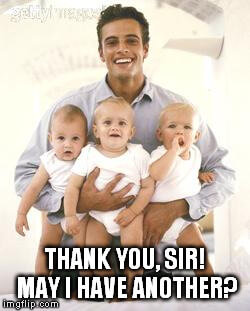Ricochet is the best place on the internet to discuss the issues of the day, either through commenting on posts or writing your own for our active and dynamic community in a fully moderated environment. In addition, the Ricochet Audio Network offers over 50 original podcasts with new episodes released every day.
 The Brotherhood of Dad: A Review of the Dadly Virtues
The Brotherhood of Dad: A Review of the Dadly Virtues

In the Fraternity of Dad, children haze their sires, who become men. Maybe. With one exception, each of the contributors to The Dadly Virtues is a member of the Frat of Dad and has stories about what he learned, what he wishes he’d known, and what he still doesn’t know.
The book is arranged chronologically, from new fathers to grandfathers, but you should start with the final essay, Joseph Epstein’s reflections on being a single father and then helping raise his grandchildren. Amongst the frat, Epstein is the man, a mensch, the incredibly cool alumnus everybody wants to be—or at least write as well as. You can read Epstein’s contribution at Commentary:
My father and I did not hug, we did not kiss, we did not say “I love you” to each other. This may seem strangely distant, even cold to a generation of huggers, sharers, and deep-dish carers. No deprivation was entailed here, please believe me. We didn’t have to do any of these things, my father and I. The fact was, I loved my father, and I knew he loved me. . . .
I was not a very good father; measured by current standards, I may have been a disastrous one. Having divorced from their mother when my sons were ten and eight years old, and having been given custody of them, I brought to my child rearing a modest but genuine load of guilt. I do not have any axiomatic truths about raising children except this one: Children were meant to be brought up by two parents. A single parent, man or woman, no matter how extraordinary, will always be insufficient.
Children, according to Dr. Spock and Dr. Freud, needed to be made to feel secure and loved. I couldn’t do much about the first. But I proclaimed my love a lot to my sons, so often that they must have doubted that I really meant it. “You know I love you, g********,” I seem to recall saying too many times, especially after having blown my cool by yelling at them for some misdemeanor or other.
You can write significantly less well than Joseph Epstein and still be a fine writer, which describes the rest of The Dadly Virtues. After reading Epstein first, you’ll have context for all the others: they’re on the path of wisdom, but they haven’t caught up to the master yet. Some highlights:
- When Mrs. Continetti gave birth to their first child, she discovered that she had to take care of a second baby, her husband Matt. His contribution—about being left along with the baby for the first time—reads like a kid starting his fraternity’s H*** Week. He’ll be all right once his son has made a man out of him.
- Few people can write, “Dogs inculcate a sense of rightly-ordered priorities,” and can keep you reading afterwards, but Jonah Goldberg can and does.
- “We were amateurs, which is a synonym for ‘parents,’” Joe Queenan notes. His essay—on school being as bad as you remember—will first make you laugh, and then will help you decide to be the ultimate helicopter parent and homeschool your child.
- David “Iowahawk” Burge gives advice for sports: “Time your daughter’s birth so that she will turn twelve in an Olympic Year, then find a stern local Yugoslavian with a high-security lockdown figure skating camp. The camp’s training bills and biannual visit policy will be hard at first. But before you know it you’ll be eating Wheaties in Maui out of a box with your daughter’s picture on it.”
- Toby “How to Lose Friends & Alienate People” Young tried to apply The Prince to child rearing and discovered “you need certain manly qualities, what Machiavelli called ‘Virtù,’ and I simply don’t have them. I used to, back in my youth. But I handed them over to Caroline when we got married, and she has kept them in her purse ever since.”
- Ricochet Grand Poobah Rob Long is the inside outsider: the childless bachelor who somehow gives shrewd advice on how to prepare your children for marriage. He’s not a full member of the Frat of Dad, but he’s wise enough to be an honorary brother: “So tell [your children] this: We will all—you can count on it—be lost in the Starbucks Wilderness in our lives. We will all—you can count on it—lose jobs and run low on confidence and feel like we missed the magic express train that everyone else caught. And when that happens, ask yourself: Will there be someone in my life who knows me, knows how hard I’m trying, knows that I’m scared about the baby and about the money and about us and about everything?”
Epstein’s contribution alone—admittedly free on Commentary—would be worth the price of the book, but buying it means you’ll get many other great stories. So what are you waiting for?
Published in General



Thanks for this! I am two months away from my first.
Iowahawk is Belgian? I thought he was French.
Edit: For those who may be confused by this comment, Iowahawk is no longer identified in the OP as David “Iowahawk” Bruges.
Received my copy a couple of days ago. Thanks again for the recommend, I’m completely hooked and know that as the years progress, it will be dog-eared by 2035.